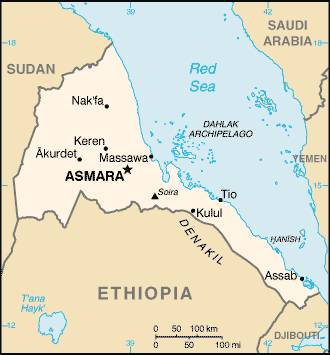Eritrea
This article is licensed under the GNU Free Documentation License. It uses material from the Wikipedia article "Eritrea". Map Courtesy CIA World Factbook
The name Eritrea is the Italian form of the Greek name ΕΡΥΘΡΑΙΑ (Erythraîa), which derives from ΕΡΥΘΡΑ ΘΑΛΑΣΣΑ (Erythrà Thálassa), the Greek name for the Red Sea. Eritrea had been ruled by many powers before it was colonised by the Italians in 1885. The Italians remained in power until they were defeated by Allied forces in World War II (1941), and Eritrea became a British protectorate. After the war, the United Nations eventually decided that the area was to become part of a federation with Ethiopia. When Eritrean independence fighters rioted in the early 1960s, the land was annexed by Ethiopia, starting a 30-year long civil war. This war ended in 1991, when Eritrean forces defeated the Ethiopian army. Two years later, after a referendum, independence was declared. In 1998, a border war with Ethiopia broke out which killed thousands of soldiers from both countries and left Eritrea with significant economic and social stresses, including massive population displacement, reduced economic development, and one of Africa's more severe landmine problems. The Ethiopia-Eritrea War ended in 2000 with a negotiated agreement known as the Algiers Agreement. One of the terms of the agreement was the establishment of a UN peacekeeping operation, known as the United Nations Mission in Eritrea and Ethiopia (UNMEE); over 4,000 UN peacekeepers remain as of August 2004. Another term of the Algiers Agreement was the establishment of a final demarcation of the disputed border area between Eritrea and Ethiopia. An independent, UN-associated boundary commission known as the Ethiopian-Eritrean Boundary Commission (EEBC), after extensive study, issued a final border ruling in 2003, but its decision was rejected by Ethiopia. As of June 2005 the border question remains in dispute, even while a tentative peace remains in place. |
|||||||||||
 The State of Eritrea is a country in northeast Africa. It is bordered by Sudan in the west, Ethiopia in the south, and Djibouti in the Southeast. The East and Northeast of the country has an extensive coastline with the Red Sea. Having achieved independence on May 24, 1993 from Ethiopia, it is one of the youngest independent states.
The State of Eritrea is a country in northeast Africa. It is bordered by Sudan in the west, Ethiopia in the south, and Djibouti in the Southeast. The East and Northeast of the country has an extensive coastline with the Red Sea. Having achieved independence on May 24, 1993 from Ethiopia, it is one of the youngest independent states.